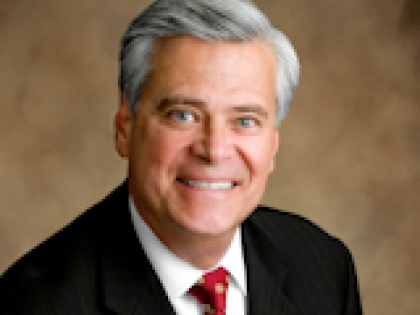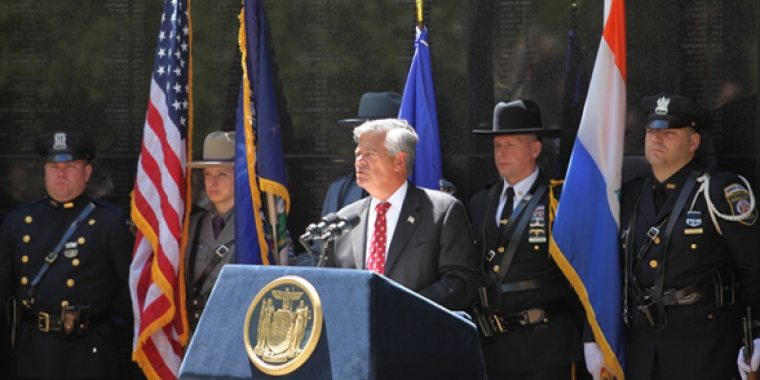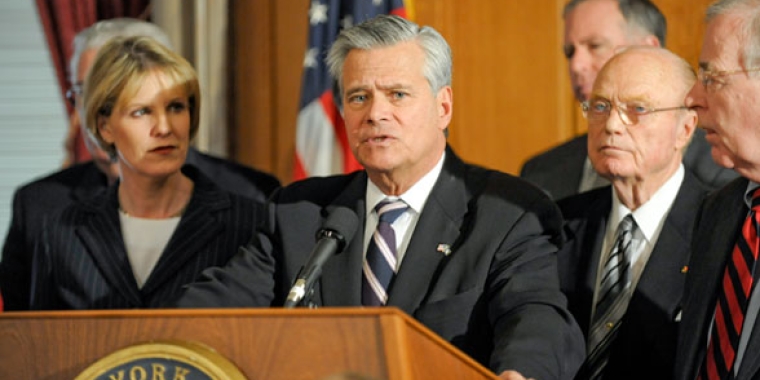
Senate Passes Bills to Curb Illegal Prescription Drug Abuse
Dean G. Skelos
February 13, 2012
Series of bills aimed at controlling abuse of prescription painkillers
With the abuse of illegally-obtained prescription narcotics growing rapidly, the New York State Senate today passed several bills to curb the black market in prescription painkillers.
Senate approval of the bills, sponsored by Senator Kemp Hannon (R, C, I - Garden City), Chairman of the Senate Health Committee, and Senator Jack Martins (R-C-I, Mineola), followed a roundtable discussion on the issue of abuse of prescription painkillers, held today by Senator Hannon and Senator Jeff Klein, Chairman of the Senate Committee on Alcohol and Substance Abuse. This was a second in a series of public meetings discussing legislation to combat prescription drug abuse and to examine improving New York’s prescription reporting system.
“Abuse of controlled prescription drugs is one of New York’s major public health problems, and it is growing at an alarming rate,” said Senator Hannon. “We have been studying the abuse and fraud surrounding prescription drugs and feel that we have to act now to control this growing problem.”
The roundtable today featured discussion and input from parents of victims whose deaths were attributed to prescription drug abuse; a physician from Bronx-Lebanon Hospital; and representatives from: the New York State Department of Health’s Bureau of Narcotics Enforcement, the Attorney General’s Medicaid Fraud Control Unit, the Long Island Council on Alcoholism and Drug Dependence, Medical Society of the State of New York, Pharmacists Society of the State of New York, the Medical Walgreen’s Pharmacy chain, and drug abuse prevention organizations.
“We are seeing our young people die from prescription overdoses and others committing horrific crimes to obtain pain killers,” Senate Majority Leader Dean G. Skelos said. “We have to update our laws to prevent more tragedies from happening and punish those who illegally make these drugs available.”
Legislation passed by the Senate today would do the following:
> Place greater controls on Hydrocodone and Tramadol, highly addictive prescription pain medications (S.5880A, Senator Hannon);
Prescriptions for opioids, particularly Oxycodone, Hydrocodone and Tramadol, have skyrocketed; among abused drugs, they are second only to marijuana. In New York City, drug related ER visits increased 40% between 2004 and 2009 with fatalities from opioid overdoses alone increasing by 20% between 2005 and 2009.
“Prescriptions for Hydrocodone, deaths from overdoses, and violent pharmacy robberies by addicts have soared as those addicted to these medications or seduced by the lucrative black market continue to access these highly-addictive drugs,” Senator Hannon said. “Hydrocodone was the drug stolen in the June 2011 robbery of a Medford pharmacy, where an addict gunned down four people and stole 10,000 Hydrocodone pills. Moving to a more restricted classification of controlled substances will toughen existing penalties for people who possess or sell large quantities of Hydrocodone.”
> Increases criminal penalties for physicians and pharmacists who illegally divert prescription drugs, which, in effect, punishes bad actors, protects consumers from compromised medications, and safeguards resources for the Medicaid program (S. 5260C, Senator Hannon);
“The black market in non-controlled substance prescription medications has exploded,” Senator Hannon, said. “Non-controlled substance prescription medications include AIDS medication, asthma medication, and anti-psychotic medication, among many others. These medications, usually the most expensive, are most often paid for with Medicaid dollars and sold on the street for a fraction of their actual value. People buy the medications and bring them to a stash house where they are collected and re-sold back to unscrupulous pharmacies or shipped overseas. This bill would increase penalties for these activities and apply them more broadly.”
In June 2011, Senator Hannon and Senator Stephen Saland (R-I-C, Poughkeepsie), Chair of the Standing Committee on Codes, held a public hearing that examined criminalizing the improper transfer and inappropriate possession of non-controlled substances and the subsequent effects on Medicaid expenditures and public health.
“People buy the medications and bring them to a stash house where they are collected and re-sold to unscrupulous pharmacies or overseas. Sometimes people unknowingly repurchase this medication and suffer complications because the drugs were improperly stored,” remarked Senator Hannon. “This bill would increase penalties for these activities and apply them more broadly.”
> Criminalize the illegal sale of a controlled substance by a practitioner or pharmacist to address practitioners operating “pill mills,” which fuel the black market for controlled substance medication (S. 6066, Senator Hannon);
Overdose deaths from prescription pain killers have reached epidemic proportions in the United States. In fact, according to a recent report of the Center for Disease Controls and Prevention (CDC), more people die from prescription drug overdoses than heroin or cocaine combined.
“This bill would create another tool for law enforcement to combat New York's prescription drug abuse epidemic,” Senator Hannon said. “New York already has a law that deals with physicians who illegally prescribe controlled substances. That law was used to indict Dr. Li who, according to reports, was running a pain clinic in Queens on the weekends where "patients" lined up before the doors opened.”
Dr. Li saw as many as 120 “patients” per day at the clinic. While the indictment of Dr. Li relates to one patient, Michael Cornetta (who ultimately died of an overdose), it is believed as many as nine people died as a result of Dr. Li’s illegal prescribing. He also reported prescribed more than 2,500 pain pills to gunman in the Medford, Long Island pharmacy shooting.
New York law currently lacks a similar provision to address pharmacists and practitioners who illegally dispense controlled substances. This bill fills that hole by creating a new crime: criminal sale of a controlled substance by a practitioner or pharmacist.
> Criminalize the first-degree illegal sale of a controlled substance to a minor under the age of 14, making it a class A-II felony (S. 3210B, Senator Martins);
“There has been a recent increase in drug use, especially opiate based substances, by young adults and teenagers, as well as an increase in overdose deaths,” Senator Martins said. “Many of these youngsters start experimenting in their teenage years with addicting prescription drugs and opiate based prescription drugs. This bill is intended to punish those who profit from the enterprise of selling these drugs to our children and provides substantial assistance to law enforcement.”
> Require the Office of the Medicaid Inspector General (OMIG) to post all administrative law decisions on their website within 30 days of decision to increase the efficiency and transparency of decisions concerning Medicaid fraud and abuse (S. 6271, Senator Hannon);
Anyone wishing to appeal a decision by OMIG must go before an administrative law judge. However, interested groups expressed concern because, although a public record, these decisions are difficult to access. Currently, each interested group must send a Freedom of Information Law request to OMIG.
“This is a duplicative and burdensome process for both OMIG and individual requesters,” Senator Hannon said. “For efficiency and transparency, this bill requires OMIG to post all administrative law decisions, in which OMIG is a party, to its website within thirty days.”
Also today, the Senate passed a resolution, in conjunction with the national day, that would designate April 28, 2012 as “Prescription Drug Take-Back Day” in New York State. The day was originally designated in 2008 by the United States Department of Justice’s Drug Enforcement Administration (DEA) in an attempt to have people turn in unwanted, unused, and expired prescription drugs in a safe, convenient way.
Last year, more than 377,000 pounds – equal to 188 tons - of unwanted or expired drugs were returned at the more than 5,300 participating sites across all 50 states on that one day.
The bills were sent to the Assembly.
Share this Article or Press Release
Newsroom
Go to NewsroomSenate Passes “Adopt-a-Park” Program
May 16, 2011

